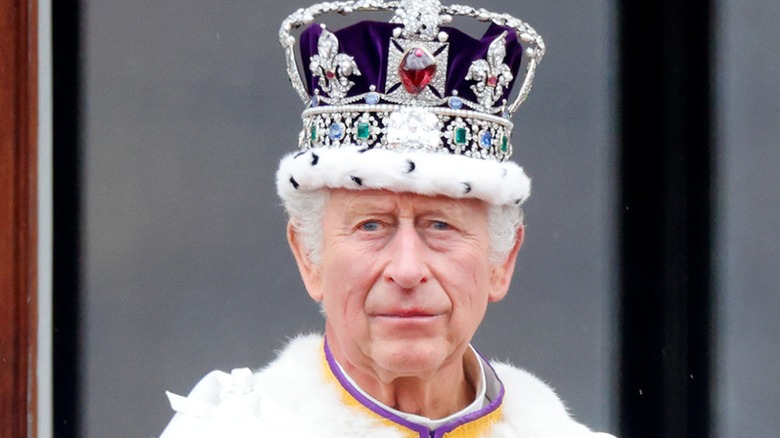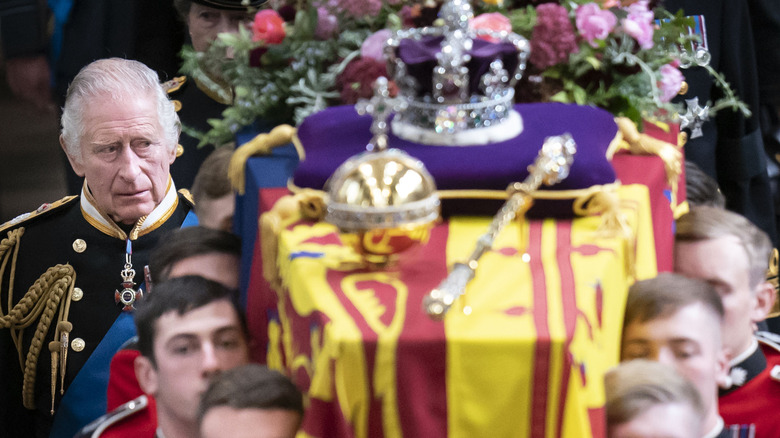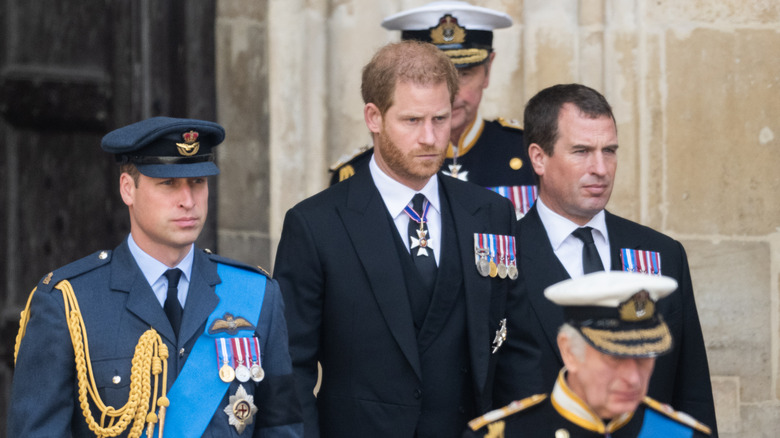How Does King Charles' Death Plan, Operation Menai Bridge, Differ From Queen Elizabeth's?
Being a British monarch comes with the somber responsibility of preparing for the day one is no longer on the throne. While supporters hope his reign will be a long one, King Charles III's health issues have made the public keenly aware another royal funeral may be on the horizon even sooner than expected. On April 25, 2024, The Daily Beast quoted an insider who claimed, "Everyone is staying optimistic, but he really is very unwell. More than they are letting on."
Charles's funeral plans actually began long before his coronation. Events like this aren't just something one can throw together at the last minute; there are protocols to follow, guests to invite, security to arrange, and military drills to practice. The "Operation Menai Bridge" plan, as Charles's funeral is codenamed, was already hundreds of pages long when Queen Elizabeth died; the very day after her own service, officials began reviewing the document and making revisions. Chief among the concerns is ensuring a strong police presence; as a military source told the Daily Beast, "[Y]ou need a giant security operation because every VVIP on the planet is there. ...The whole thing goes from flash to bang in under two weeks, which means every aspect of it needs to be meticulously planned in advance."
Because the queen's ceremony went off so well, the pressure is on to ensure the same will hold true for her oldest son.
Certain aspects of royal funerals don't change
Queen Elizabeth had a heavy hand in planning her own funeral, and she had plenty of time to do so. A staff of nearly 300 people began planning "Operation London Bridge" in 2002 — 20 years before her death in September 2022 — virtually guaranteeing it would go off without a hitch. Though King Charles III will likely have less time to sign off on his own plans, there are certain traditional aspects already in place we can expect to see.
Operation Menai Bridge is named for a suspension bridge in Wales, befitting Charles's long tenure as Prince of Wales. At the confirmation of his death, the palace will alert the prime minister and other government officials, followed by notifications to Commonwealth nations, before announcing the news to the general public. As with his mother before him, Charles's coffin will lie in state at Westminster Hall for some time, and members of the royal family will stand watch along with military guards.
The funeral will take place some days later (the queen's was held about a week and a half after her death), with a solemn procession to Westminster Abbey flanked by members of various military units. The Daily Beast source noted Charles' guards will likely include the Parachute Regiment, a division with which he was closely involved. This is just one of the personal touches he may include at his service.
King Charles' sons Prince William and Prince Harry must plan, too
Just as King Charles III included some unusual details in his coronation, he may opt to put his own personal stamp on certain aspects of his funeral service, such as the readings from the Bible and other sources. Royals are allowed to select the music at the ceremony, so he may have already commissioned pieces from contemporary composers. (Sir Andrew Lloyd Webber wrote a special anthem for the coronation.) Expect to see the garden-loving king's favorite blooms — delphiniums — either in the cathedral or the coffin arrangement.
The guest list for Charles's funeral won't be as small as the one for his father; Prince Philip's took place during the pandemic, so his service featured just 30 mourners. But in keeping with his desire for a more modern monarchy, he might well trim the total to a considerably smaller number than the 2,000 heads of state and other guests featured at the queen's service. Of course, his family will be front and center in the funeral procession, with Prince William — or, rather, King William — leading the way. This time, there will be no question about Prince Harry, Duke of Sussex, staying several steps behind his brother.
Speaking of whom, William and Harry also have "bridges" in the making. In the wake of the controversy surrounding Princess Diana's funeral, the British government asked the princes to start planning their own funerals when they were just 18 and 16, according to The Telegraph (via ABC News).


